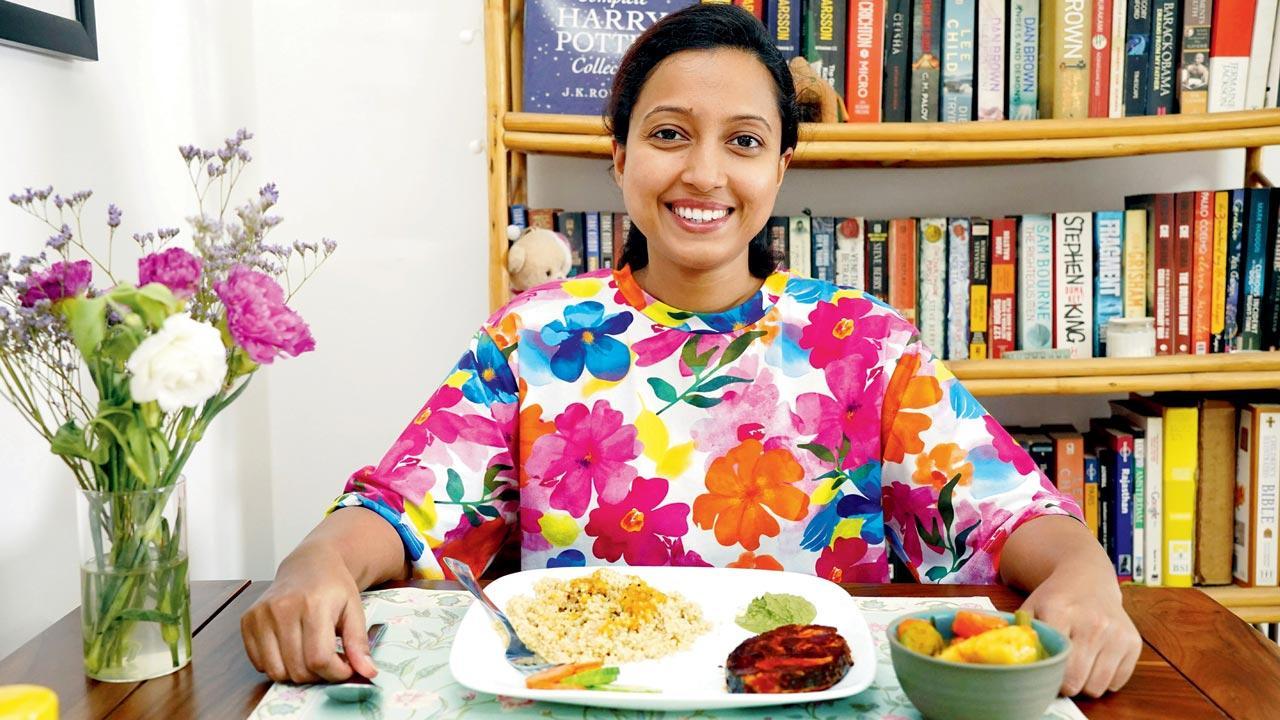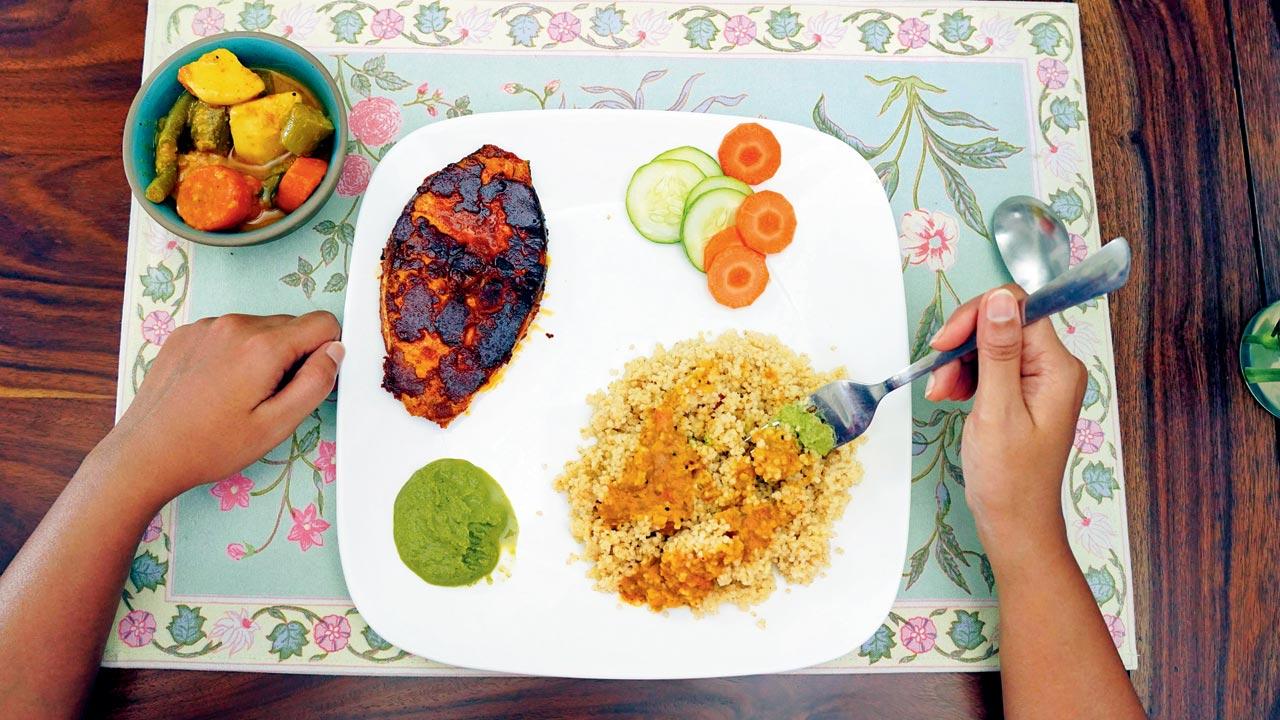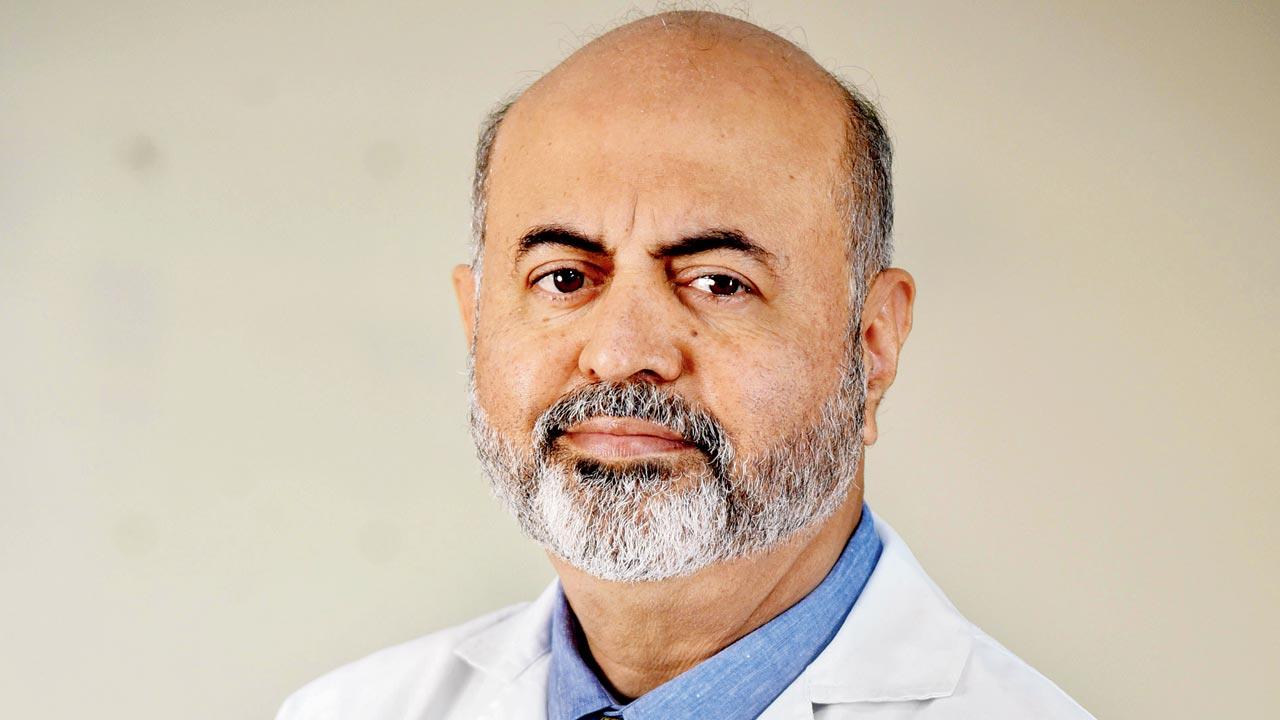Our second brain’s health is dependent on what we eat, but also what social media we consume. And how well it feels can either make or break us

Sharel Bernadine changed her entire lifestyle—a slower-paced professional role, self-cooked fresh meals of millets, rice, vegetables and diluted pulses and lentils—to stabalise gut health over six months
To be able to plan what she eats through the day, Sharel Bernadine needs to pay attention to her poo. “If it’s solid and once a day, I might dare eat fast food,” says the Andheri-resident. “If I get cramps have to go to the loo a few times, I know the gut biome has changed.”
ADVERTISEMENT
And then she goes back to her careful food preparation: Millets and rice, and not roti; gluten is harder for her to digest. Dals watered down so that they are broken down easily by her system. Seasonal vegetables. Everything is fresh, and she cooks it herself, having learned through experience how much spice and oil her gut can withstand. “After all, your energy goes into your food,” says the independent talent manager.
If Bernadine spoke to Swetha Ashok, the nutritionist and lifestyle consultant who goes as the The Gut Guru on Instagram, she’d recommend adding tubers to her diet: Arbi, potatoes, sweet potato, purple yam, carrots, beets, radish. “Unfortunately, we’ve become a carb-fearing nation,” says the Goregaon resident, who comes from a background of microbiology and biochemistry. “But these carbohydrates feed two important groups of probiotic bacteria: bifidobacterium and lactobacillus. A good balance has to be maintained between protein and carbohydrates, as excessive proteins feed the bad bacteria. Eat tubers thrice a week, with a slight tadka, as a side—the oil helps nutrition absorption. More than anything, diversity in your diet, based on seasonality, is what balances gut flora.”

And if Bernadine had found herself in Dr Vipulroy Rathod’s consulting room at Fortis Hospital in Mulund, the director of gastroenterology would quiz her about her screen time and social media consumption. “The mind-gut axis is a proven and established science,” he explains, “the two are in constant dialogue with each other through neurotransmitters. Imagine a family receives some bad news; a member may rush to the toilet. That’s nothing but the chemicals affecting the motility of the bowels. Of the 100 patients who would come to me complaining of abdominal pain, acidity, acid reflux or bloating, in 60 to 70 of them, it’s a direct psychological impact.”
What does this have to do with how much time we’re spending glued to screens? “In the pre-digital revolution era,” Dr Rathod expounds, “bad news would be broken in a soft manner—through a telegram or a phone call. Today, you utter one wrong word on the Internet, and you are bombarded with psychological damage from all across the world in five seconds. We are a generation seeking instant validation; and when we don’t receive it, we experience rage, anxiety and depression, all of which make your brain emit chemicals that mess with your gut flora.”
But Bernadine wisely did what Ayurveda proponent Amrita Kaur Rana preaches as @amritaoflife on, ironically, Instagram, even though she did not consult her directly: She listened to her body to find out what works for her, and made lifestyle changes that included becoming an independent professional.
 Swetha Ashok, nutritionist
Swetha Ashok, nutritionist
“Though you could consult an Ayurveda doctor,” Rana, “You could also observe your body and reflect; you have enough data: How you feel when you wake up in the morning? How does your skin look? How is your tongue? Does it have a white coating or sliminess? That indicates undigested food. Do you have a pimple? It could also be caused by a hot emotion, not just hot foods. Envy, anger, jealousy—these are all hot emotions you encounter while scrolling through social media.”
Bernadine’s is a case of pre-existing irritable bowel syndrome (IBS) made worse by a bout of COVID-19 in 2022. And that’s just one symptom in a bouquet of them that indicates bad gut health. The gut, colloquial for the gastrointestinal system, comprises the oral cavity, pharynx, esophagus, stomach, small intestine, large intestine, and anal canal. It accessorises with teeth, tongue, salivary glands, liver, gallbladder, and the pancreas.
The vagus nerve is the bi-directional highway on which information between the GI and the brain travels. It’s key part of the parasympathetic nervous system, which plays a role in regulating and communicating to involuntary functions such as digestion, heart rate, blood pressure, respiration, immunity, mood, mucus and saliva production, and urine output. There are more nerve cells in the GI tract than anywhere else in the body outside of the brain.
 Maintenance is key, as gut micro biome changes as we age, says nutritionist Swetha Ashok, with a 30 per cent decrease in it every 10 years. So, we have to tend to it like an exotic garden of bonsais with food diversity, and sulphur-rich foods such as onions, garlic. “Even our pickles, and fermented foods such as dosa, idlis, dhokla are probiotic. As simple as a bowl of curd will also do”
Maintenance is key, as gut micro biome changes as we age, says nutritionist Swetha Ashok, with a 30 per cent decrease in it every 10 years. So, we have to tend to it like an exotic garden of bonsais with food diversity, and sulphur-rich foods such as onions, garlic. “Even our pickles, and fermented foods such as dosa, idlis, dhokla are probiotic. As simple as a bowl of curd will also do”
And research has linked weak gut to autoimmune conditions such as irregulation of the thyroid glands, rheumatoid arthritis, multiple sclerosis, and type 1 diabetes. Since damage to the gut affects concentration and mental faculty, it has been linked to learning disabilities in children and difficulty in adapting behaviours such as impulsivity and temper control.
As much as 70 per cent of dopamine, a type of neurotransmitter and hormone that plays a role in memory, pleasurable reward and motivation, is produced in the gut. Serotonin, the chemical that carries messages between nerve cells in the brain and is crucial for mood regulation, sleep, and sexual desire, is also made in the gut—90 per cent of it.
In January this year, a study conducted by researchers from the University of Surrey and the University of Alabama at Birmingham suggested that Parkinson’s disease begins here too. It found that healthy people and people with preclinical Parkinson’s disease have markedly different species of bacteria and the biological processes in which those bacteria are involved—despite being on the same diet.
 Dr Vipulroy Rathod, Director Gastroenterology, Fortis Hospital Mulund
Dr Vipulroy Rathod, Director Gastroenterology, Fortis Hospital Mulund
Swetha says a lot of research on the gut-brain axis was initially done in the 1600s, but then was not explored further till the 1700-1800s. “In the 19th century,” she says, “they slowly figured out that some form of nervous energy or irritability is happening when the food patterns/diet is not the best. In the 20th century, came the word probiotics, and microbiological developments were supported. Now we know that poor gut microbiome manifests through a compromised immune system, tons of health issues, stubborn weight, malnutrition, Crohn’s disease, and slow brain performance.” And lately, there has been evidence linking it to Crohn’s and Alzheimer’s too.
And with this knowledge came the pre and probiotic drinks, supplements and foods. Kombuchas, kefir, saurkrauts, yoghurts, kimchi, tepache in rainbow hues line posh kirana dukkans, and sachets to be mixed in water sit in as many flavours on the shelves of the chemist. In 2022, the drinks market in India reached R955 million; it is estimated to grow at a rate of 19.9 per cent to reach R7.7 billion by 2027.
“Not all fermented foods are created equal,” says Swetha, “Some may contain excessive salt, sugar, or artificial additives, which can negate the benefits. We think medication or supplements can help heal our gut, but the truth is, without proper nutrition and mindfulness practices, gut recovery can be an uphill battle.”
Change will come with a shift in the way doctors diagnose the illness. “Specialists will look at an organ,” says Dr Rathod, “But the body is an organism. The physiological and the psychological have to be treated parallelly—70 per cent of organic tissue is bacteria, virus, and fungi that are not attuned to digital bombardment that we see in our daily lives. This needs a formidable solution. I only recommend some probiotics in that form, and of course, Calcium, Vitamin D3 and B12 are also important supplements.”
He draws attention to the difference between hygienic and sterilised food and living. Lack of exposure to the bacteria necessary—through food, environment, and lifestyle—to build immuno-resistance. “Our roads are paved, we live in towers and we eat food out of packages that is made using GM crop loaded with pesticides. We pop antacids after eating heavy food, are prescribed steroids and antibiotics for the little of things so that we can get back to work quickly,” says the doctor. “It is not enough that we eat an ancestral diet; we must also, to some degree, follow ancestral activity.”
The serial popping of antacids after heavy meals is also a culprit: The stomach produces 1.5 litres of gastric juices, most of it hydrochloric acid to break down food. An antacid will bring it down to a quantity insufficient to digest that heavy meal, leaving it sitting undigested. Dr Rathod suggests that the self-aware patient should not opt for medicines over the counter at the pharmacist, and also see a doctor if the symptoms persist for two weeks or you have frequent relapses.
So what does a healthy gut, with its balance of 300 to 500 bacterial species comprising nearly 2 million genes—in a population that’s 10 times all of the cells in the human body—look like? “That’s what we don’t know!” says Dr Rathod. “To find an ideal specimen, we’ll need to find a human being from Bastar, who eats seasonal and local food untouched by pesticides, whose skin is exposed to naked earth.” He adds that the next Nobel prize in medicine would go to the scientist who successfully maps the entire gut genome.
In the West, the epidemic of sterilisation has given rise to faeces banks like blood and sperm banks, where faecal deposits from healthy human specimens are invited, dried and processed, and mixed with saline and transferred to a patient in need of recultivating their gut microbiota. The process is called Faecal Microbiota Transplantation.
We don’t want simple solutions,” says Rana. “Everything has to be complex, no. In Ayurveda, wellness comes from tending to your agni, digestive fire, so that you have balanced or sama agni. Simply eating fresh, local and seasonal produce, chewing your food so that sufficient saliva—containing enzymes that breakdown food—is released; eating mindfully, while sitting down; keeping a gap between bedtime and dinner, not bathing after eating, are all sufficient. As they say, say
seer rakho thanda, pair garam aur pet naram.”
As with everything Ayurveda, knowing your doshas and balancing them, and a little self-knowledge from peeking into the toilet bowl to observe the deposits goes a long way. As does the process leading up to it: Can you go easily, is it quick and pain free and thorough? Do you strain? Is it excessively oderous? Is there a presence of mucous or blood? Does it stain the sides? Does it sink?
How often to go?
Bernadine’s stomach cramps strongly and distinctively when her gut goes haywire, and she needs a bio break often. “IBS can be controlled, but may not be reversible in most cases, and I was diagnosed six-seven years ago,” says the 37-year-old, “And it took me six months, post COVID, to bring back gut health. I was constantly fatigued and had no focus. I used to manage music artistes and that was a job that did not have regulated hours. I would need to sleep as soon as I ate. Antibiotics are not a longterm solution; I chose instead to eat the right food in the right way to find a cure. It took six months of supplements, trial-and-error to regain guilt health and know what I can and cannot eat.”
She cut out sugars, lactose and gluten completely and saw a drastic change within three months. Even high sugar fruits such as bananas, chickoos, custard apples and corrosive citrus fruits are out. “I ate a lot of millets and can eat all vegetables, but I dare not eat dairy at all—it disagrees with me terribly. In fruits, I can only eat pomegranates, kiwi, papayas, berries and boiled apples.”
Maintenance is key, as gut micro biome changes as we age, says Swetha, with a 30 per cent decrease in it every 10 years. So, we have to tend to it like an exotic garden of bonsais with food diversity, and sulphur-rich foods such as onions, garlic. “Even our pickles, and fermented foods such as dosa, idlis, dhokla are probiotic. As simple as a bowl of curd will also do.”
The most chronic and debilitating of urban lifestyles diseases, depression is greatly linked to the gut as the main factory for serotonin and dopamine. A content writer, in her first job, had a target of 15 stories in eight hours, going viral. “I struggled with depression and anxiety, and would drink tea to stay awake. I would miss meals and live on chai-biscuit,” says the now 26-year-old. “This was seven to eight years ago, and I would need 10 to 12 hours of sleep—I’d go to bed at 11 pm and sleep until 11 am to 1 pm. I had debilitating stomach cramps since childhood to the point that my parents took me to a baba who said I had been possessed by a chudail. It came to a point where my stomach would hurt the moment I ate. An endoscopy showed that my oesophageal sphincter was loose causing acid reflux.”
Nutritionists prescribed water in which raisins had been soaked overnight, water with hulk and in the morning, palm sugar solution and she admits it may have stopped things from getting worse, but real change came with a change in psychiatric medicine in 2019 that regulated sleep.
And the biggest change? Regular, fresh, home-cooked meals enforced by her boyfriend of three-and-a-half years.
 Subscribe today by clicking the link and stay updated with the latest news!" Click here!
Subscribe today by clicking the link and stay updated with the latest news!" Click here!







